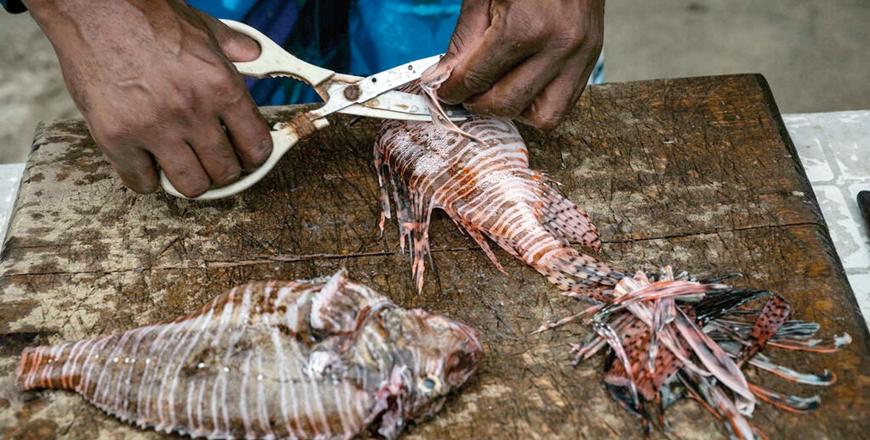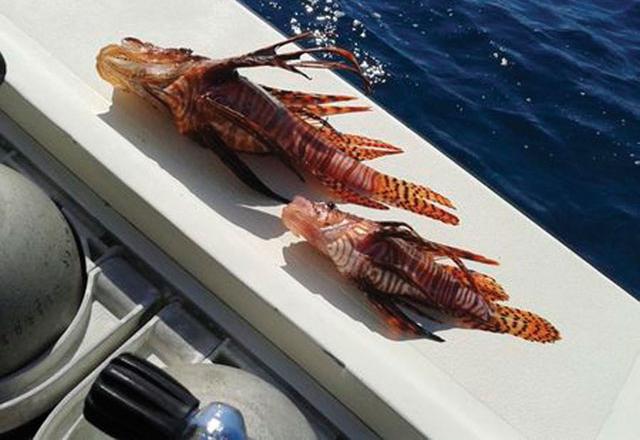You are here
Lionfish — an invasive menace terrorising Venezuela’s coast
By AFP - Dec 11,2021 - Last updated at Dec 11,2021

Fisherman William Alvarez cuts off the poisonous spines from a lionfish while cleaning it to prepare ceviche that he sells to tourists on the beach of Chichiviriche de la Costa, Vargas state, Venezuela, on October 30 (AFP photo)
CHICHIRIVICHE, Venezuela — The dazzling, colorful lionfish is a must for any exotic aquarium, but it has also become a major threat to the western Atlantic Ocean and the Caribbean.
“It’s beautiful, but you have to kill it,” says Mavi Escalona, a Venezuelan nurse and amateur spearfisher.
“It causes a lot of damage, and it’s delicious!”
The spectacular, stripey lionfish with its venemous spines is a carnivore originally from the Indian and Pacific oceans that has now become an invasive species in the Atlantic and Caribbean, posing a threat to their ecosystems.
Known by many other names such as zebrafish, tastyfish and butterfly-cod, the lionfish can now be found from Florida to northern Brazil.
And it has a voracious appetite: eggs, small fish, crustaceans, molluscs. It is at least partly responsible — alongside over-fishing, pollution and climate change — for a drop in the numbers of other fish in the area.
“It’s an invasive fish. It doesn’t have competitors or predators,” said Laura Gutierrez, a Venezuelan biologist now based in the Canary Islands of Spain but who studied lionfish for many years in her homeland.
The lionfish was first spotted in Florida in 1985.
“People that had them in their aquarium released them because they ate their other fish or it was difficult to feed them,” said Gutierrez.
“It is eating all the commercial fish, crustaceans, fish and molluscs that keep reefs and corals clean, fish that eat algae.”
What happens in an aquarium takes place on a much larger scale in the Caribbean, and could do so, too, in the Mediterranean, which lionfish have started to colonise.
“We’re not talking about eradicating them, you can’t. It’s very difficult but we’re talking about minimising their impact,” said Gutierrez.
Unprofitable
Venezuelan authorities have organised fishing competitions and promoted eating lionfish to try to stymy their inexorable spread.
“The only ones that can control them are us: fishermen,” said Willy Alvarez, 35, a dreadlocked spearfisher in Chichiviriche de la Costa, a small village between the sea and the mountains, around 60 kilometres west of Caracas.
Alvarez, with his permanent smile, heads out to sea every day with his mask, snorkel and harpoon.
“The first time I saw one was in 2008 or 2009... I caught it to put in an aquarium,” he said after climbing back on board his boat, a lionfish skewered on the end of his spear.
“Their reproduction is incredible: 30,000 to 40,000 eggs every three to four days.”
He catches one every day and turns it into a ceviche — a marinated raw fish dish — to sell on the beach to passersby.
It’s not a very profitable business. To produce 1 kilogramme of ceviche, which sells for $20, he needs to catch 3 kilogrammes of lionfish, meaning dozens of free dives — each one lasting around 40 seconds. And then there’s the time taken to prepare the dish.
“It’s a lot of effort. I can’t live off that but one lionfish less is thousands of little fish it won’t eat. It’s satisfying to help the ecosystem,” he said.
‘Better than lobster’
A decade ago, the lionfish was still unknown off the Venezuelan coast and its sudden appearance caused fear amongst many locals.
It’s curious beauty and venemous spines that can cause sharp pain or even paralysis have contributed to the mystery around what many locals call the devilfish.
Some even think they are spirits.
Unsurprisingly, it is little eaten here.
“We have to involve the local community,” said Gutierrez.
“We have to explain what the fish is. We have to explain that it’s edible, that it’s tasty.”
The spines and skin can also be used to make jewelry.
“If we create demand, we’ll ensure more are taken out of the sea and that will help limit the population,” she added.
“Delicious” exclaimed Genesis Palma, a 20-year-old cashier, tasting lionfish for the first time in Chichiriviche.
“Lionfish is the best,” added Juan Carlos Gutierrez, one of Alvarez’s clients.
“It’s better than lobster, better than caviar!”
Related Articles
In a reef just off the popular USS Kittiwake dive site in Grand Cayman, hunters armed with spears seek out lionfish — an invasive species so destructive that authorities want them caught and served up as a tasty dish.
CHICHIRIVICHE DE LA COSTA, Venezuela — Efren Rodriguez leaves the table annoyed as his fellow players, drunk and laughing, cry out “Zapato!
LAS VEGAS — Saul “Canelo” Alvarez retained his undisputed super-middleweight world title on Saturday, seeing off Gennadiy Gennadyevich Golov

















